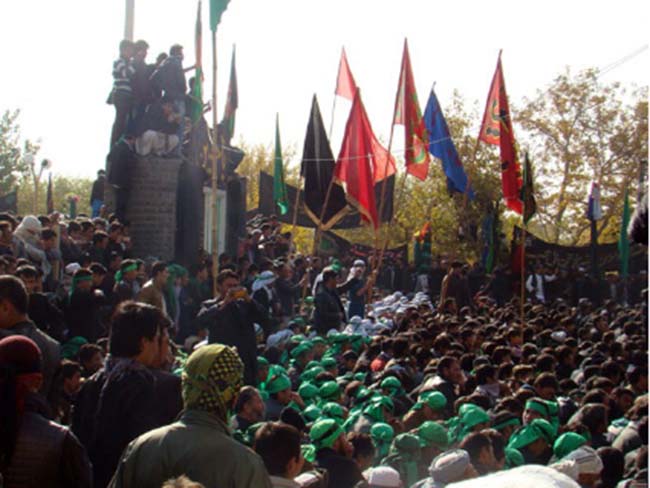Ashura, the 10th of Muharram, marks the day that Imam Husain (A.S.) along with his 72 companions, embraced martyrdom in the blazing desert of Karbala for reviving the religious beliefs, humanity and ethical code. He revolted against the despotic regime of Yazid, rather than agreeing to a humiliating pledge of allegiance. He affirmed, “To die in glory is far more honorable than to live in humiliation.” Left with two choices namely death or allegiance, he chose the glory of death.
Today many Muslims around the globe are commemorating the martyrdom of Imam Husain (A.S.) who is to be regarded, without any dispute, as the champion of freedom. This episode is often called the tragedy of Karbala. However, it would be better to be called the “the redemption of freedom”. From a higher perspective, it is sad to classify the sacrifice of Imam Husain (A.S.) as mere tragedy, for such classification would keep the divine message of Imam’s sacrifice within the context of tears and emotions. Furthermore, it may render this universal human revolution into sensational event devoid from any real purpose. Consequently, this would compromise its main goals and objectives and that is to uphold the principles of justice and love.
The overwhelming level of love and emotions which are displayed by the Muslim during Muharram annually are admired. However they must be very aware of the danger of their current emotional approach and the corrupted traditions of the event, towards the Imam’s martyrdom. There is too much emphasis on the physical aspect of the battle and very little attention towards the true purpose of Imam’s universal message of peace and love and humanity. The relentless and perpetual talks of the details of the mutilations of Imam Husain (A.S.) and the martyrs of Karbala in essence represent a mutilation of the entire message of Imam Husain (A.S.).
Imam Husain (A.S.) intended to free human societies from the clutch of cruelty and dictatorship. He injected a sense of valor and fearlessness into hibernated community of his time – and his movement transcended the particular time and location. His movement represented that sometimes only drops of blood will be a panacea for social problems – as his blood prevented from the erosion of religious tenets and moral principles.
Moreover, Imam Husain’s (A.S.) epic movement upheld the rights and dignity of the public. Life was cheap and one could not breathe a word despite the prevalent evils. The Sultan, Yazid, paid no heed to social mores and violation of rights was the daily practices. Those who had a share in the regime enjoyed a luxury life at the cost of people’s life and dignity. Imam broke the silence and raised his voice against the status quo. He said that an honorable death was far more admirable than a humiliated life. So, he chose death not only to get rid of disgraced life but also to breathe life into humanity and ethical values.
Besides mourning over the tragic scene of Ashura and flagellating ourselves to commemorate Imam Husain’s (A.S.) martyrdom as religious rituals, we have to practice his words and acts in our collective life. The Muharram ceremony should be held without any extremes or irrational deeds to avoid deviance or sparking violence. In other words, we have to amend our culture according to Imam’s words and intention. For instance, the clergy believe that flagellating oneself with knives to mourn over Karbala’s tragedy is considered taboo. Additionally, it will mirror a violent culture to the world and triggers a sense of hatred. So, it would be far rational to donate blood to the wounded civilians and soldiers, as some people do, and institutionalize it as a culture in the holy month of Muharram.
One of the philosophies behind Imam’s revolution was to amend cultural norms and social mores. He revolted when the humanity was on the verge of erosion and his words fell on deaf ears. In such a critical time, he had no recourse but to resort to sword and let his blood stream in the pages of history to convey his human message to the next generations.
Imam Husain (A.S.) was martyred neither to force ineffective tears in a number of eyes nor to have some weep over his wounds but to have them follow his path and practices. Today, the philosophic and practical aspects of Karbala’s historical episode are more essential for our society than the tragic aspect. In another item, the tragedy of Karbala must not outweigh its message and goal and a surge of emotional feelings should not put our rationality under question. Commomorating Muharram is tantamount to vowing to Imam Husain (A.S.) to practice upon his deeds and words, to live an honorable life i.e. a life empty of cruelties, moral corruptions and other evils.
Imam Husain’s (A.S.) blood pulses through the veins of history to keep the heart of human societies beating. His revolution revitalized religious tenets, moral and cultural values and human practices. In a nutshell, he sacrificed his life to protect humanity and divine messages and to protest against the evils and devils. He preferred an honorable death to a dishonorable life as he said, “The glorious death is far more honorable than inglorious life.”

